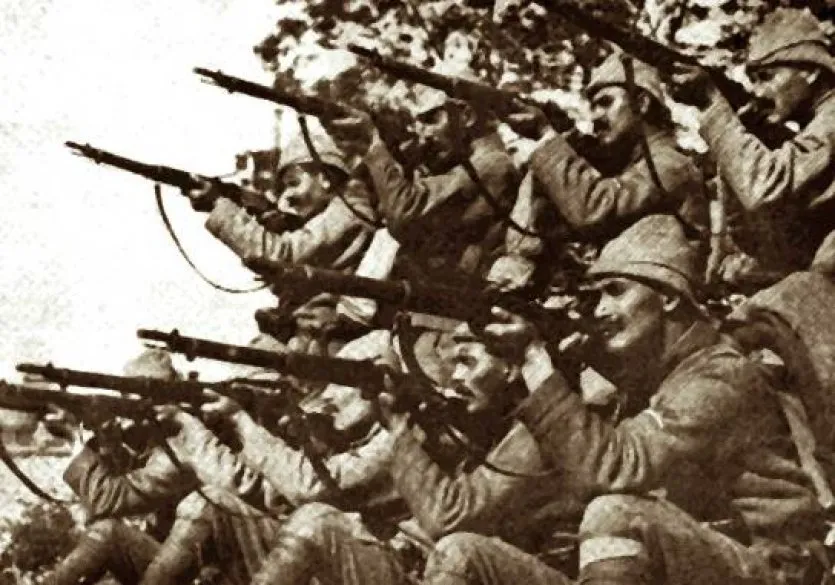On the first day of the Inönü war there was a very violent conflict between the Turkish troops on the western front and the Greeks. The Turkish soldier fought as if he had no life. Every attack of the Greeks was answered with counterattacks, and they could not advance. Apparently the enemy had not found what he had hoped. The fact that the Turkish troops, instead of the empty fronts in the Inönü positions, encountered the infantry and artillery fire really and surprised them. The battle lasted from the morning to the evening on 10 January.
Commander of the Western Front, Colonel Ismet Bey, came from Gediz to the battlefield that morning and began commanding the war under fire. The Greek troops used a place in the Turkish positions and reached the north of the Inönü front, where the headquarters of the Western Front was located. In view of this critical situation, the Turkish troops were withdrawn from that position and quickly transferred to the village of İnönü. This part of the front was reinforced by the relocation of the armed forces.
On that day, the Turkish soldiers prevented the Greek troops from progressing because of the enemy's constant attacks, without stopping for a moment. There is no doubt that the Turkish army has suffered heavy losses as a result of these attacks. But the Turkish soldiers knew that the country stood above their lives and that their sacred homeland had to be defended at all costs. After two days of violent battles, the enemy was finally out of action. The Greeks realized that they could not succeed with their attacks. They saw the situation and for them there was only one thing left: retreat! The decision of the Greek armed forces was implemented on the night of 10 January 1921 and they began to retreat towards Bursa on the morning of 11 January.
On the occasion of the victory on the Inönü Front, the President of the Great National Assembly, Mustafa Kemal Pasha, sent a telegram to the Commander-in-Chief of the Western Front, Colonel İsmet Bey, on January 11, 1921, saying: "I would like to congratulate all officers of the Western Front on their victory.
The victory over the Battle of the Inönü Front was indeed a good start, because this victory would later be followed by the Second Inönü War, the Sakarya War, the Wars of 26 August and 30 August. Now the problem with the Circassian Ethem armies was pursued where it was left. These superimposed forces were completely eliminated by rapid forward movement. Circassian Ethem and his brothers sought help from the Greeks as their last refuge. With the suppression of this rebellion, the unity of the military and its only chain of command in the national army was fully guaranteed.
The I. Inönü victory had shown great effects both internally and externally and triggered great political developments. This triumph had wiped out the despair that lay in the air and given the newly founded state its foundations. On January 20, 1921, the first constitution was passed in the Great National Assembly of Turkey, on the firm foundation of a new state. With this victory peace and security were guaranteed again and the efforts for the creation of a regular army were accelerated.
The external influences of the first Inönü victory were also important. With this victory, the regular army put its first test against the enemy and showed its unbeatable will. This triumph showed the other states that the Turks would not give up and would fight at all costs for their freedom and very important: their independence. Because of these developments, the Allied States, invited with the old Ottoman government from Istanbul, also the new democratic government from Ankara, to a conference in London on February 21, 1921. But the real claim to victory went to the new democratic government of Ankara. For this reason, Ankara representatives did not participate in the Ottoman delegation and formed their own group to defend the national case.
As much as the Ottoman Prime Minister and great vezier Tevfik Pasha wanted to see the old Sultan government as the winner, he had to pass on the right to speak at the conference to the representatives of the new government of Ankara. The old rulers of the ottoman empire and their allied outlandisch powers had to accept their defeat. Due to these developments, the Allies had to prepare a new peace offer. Thanks to the external reputation of the Inönü victory, the "Moscow Treaty" with the Soviet Union was signed on 16 March 1921. In London there were several talks with France and Italy on the road to peace too.
However, the Greeks had not learnt from the defeat of the first Inönü war and marched from the same fronts inland to Anatolia again on 23 March 1921. On 27 March 1921 the Greeks attacked the positions of Inönü again. In the second Inönü war the enemy attacks were stopped as the first time. On 31 March 1921, after the Turkish troops on the Western Front began their counter-attacks, the Greeks decided to retreat again. But this time, on 1 April 1921 they had to leave the battlefield with thousands of dead soldiers.
The II. Inönü Victory went down in history as a great success and sealed the determination of the Turks even more.
On the occasion of this victory, Mustafa Kemal Pasha sent a telegram to the commander of the Western Front, Ismet Pasha:
"You have not only conquered the enemy there, but also the misfortune of the whole nation in which we found ourselves!"




 Part 13
Part 13
